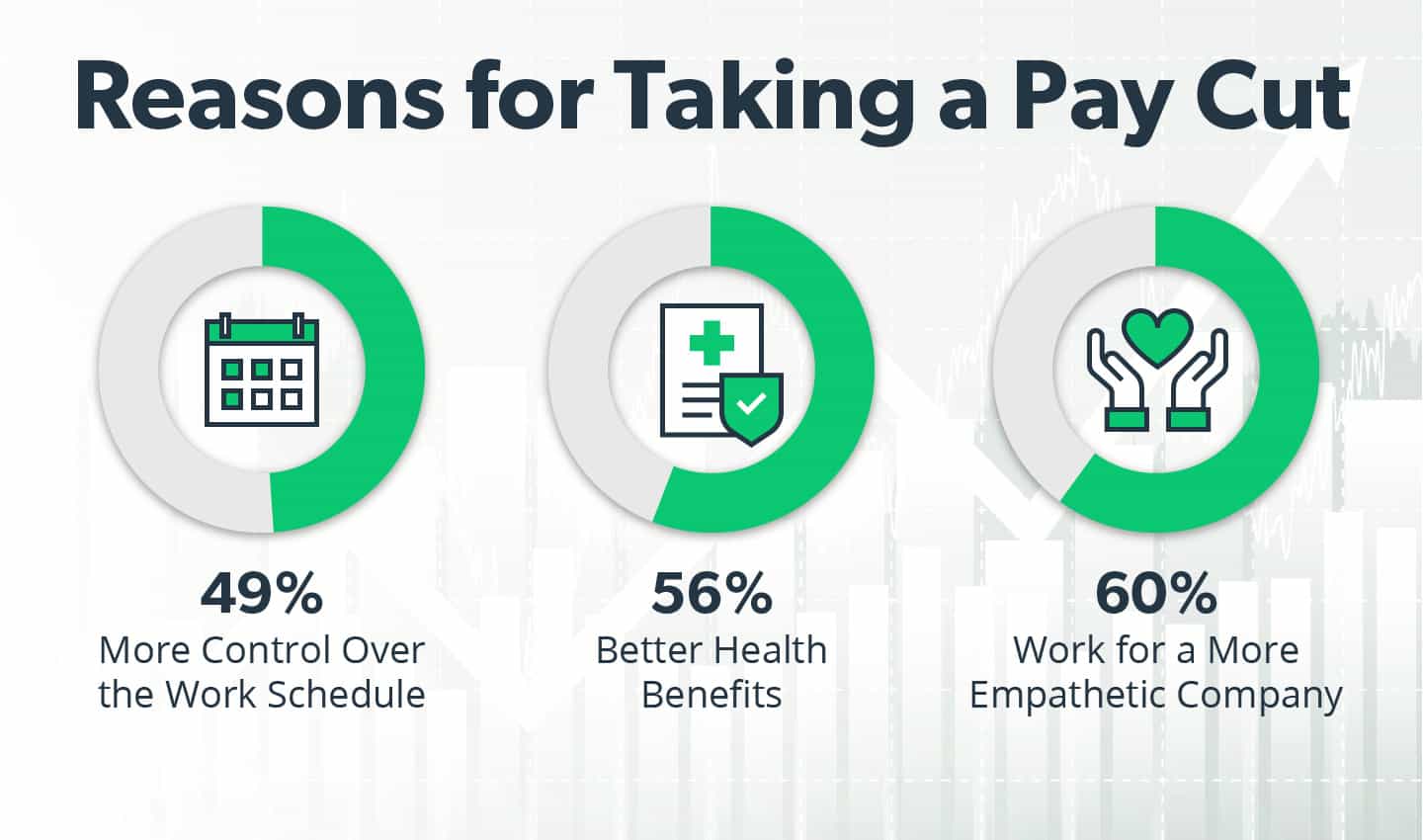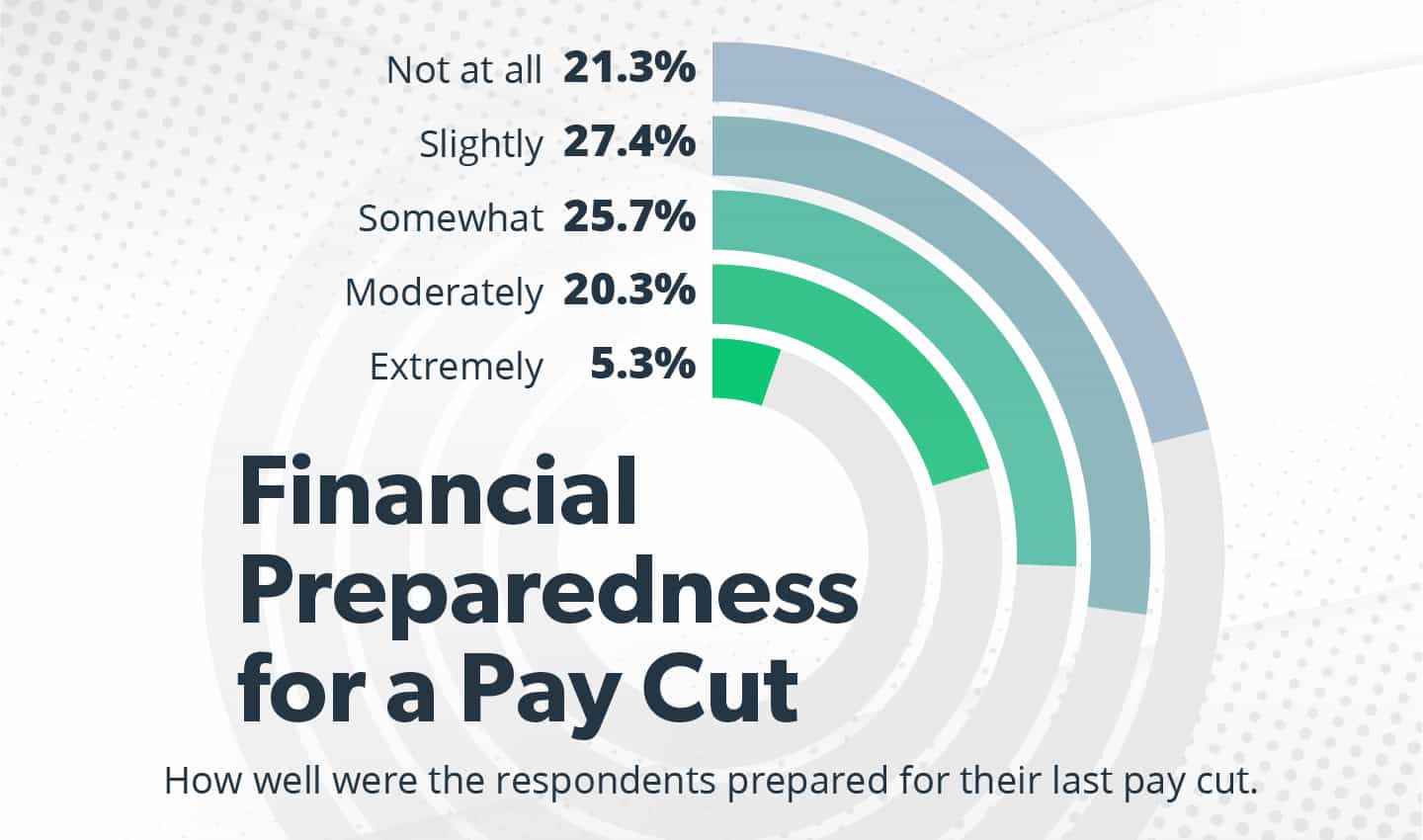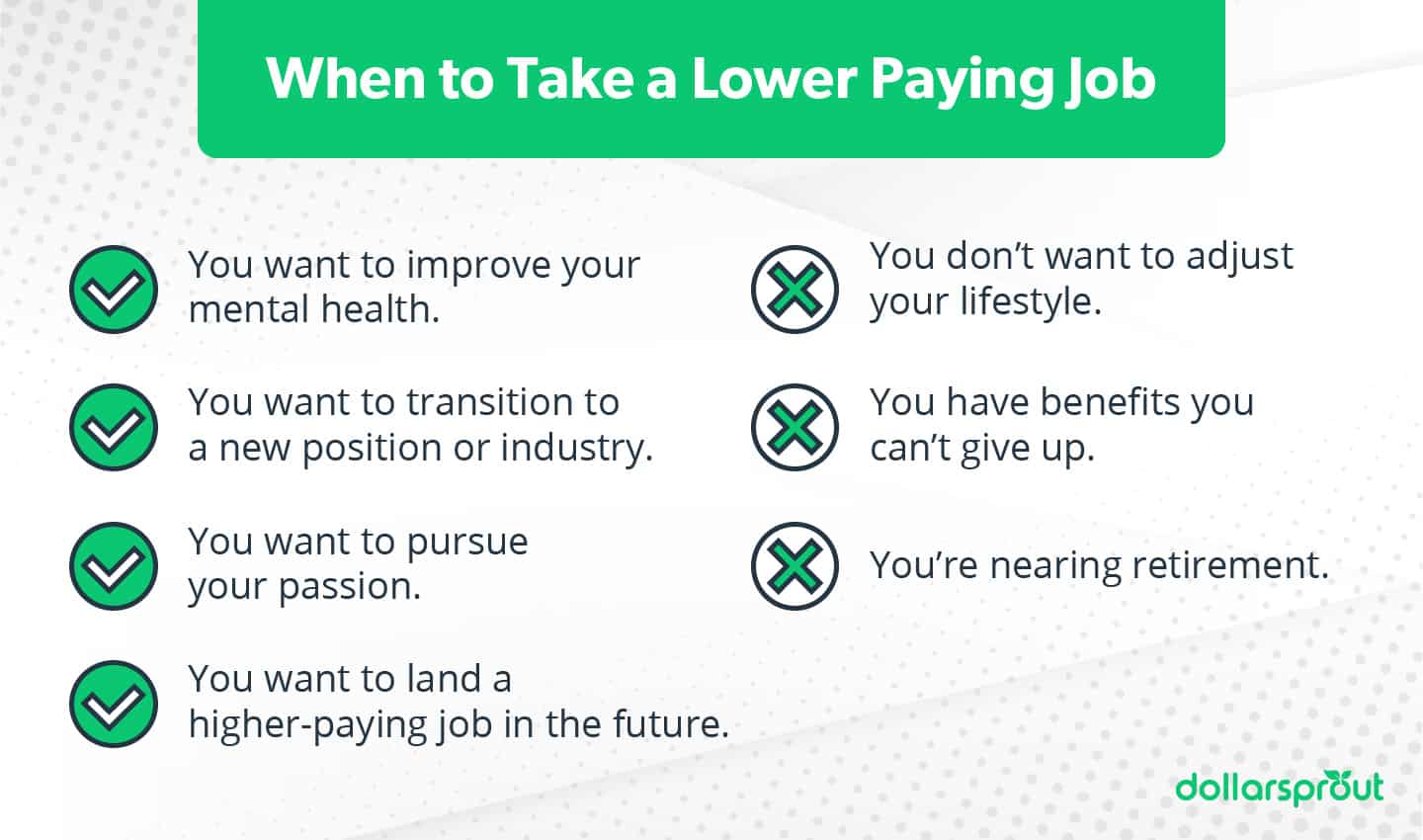Should I Take a Pay Cut? 7 Important Things to Consider When Deciding
Our readers always come first
The content on DollarSprout includes links to our advertising partners. When you read our content and click on one of our partners’ links, and then decide to complete an offer — whether it’s downloading an app, opening an account, or some other action — we may earn a commission from that advertiser, at no extra cost to you.
Our ultimate goal is to educate and inform, not lure you into signing up for certain offers. Compensation from our partners may impact what products we cover and where they appear on the site, but does not have any impact on the objectivity of our reviews or advice.
As we progress in our careers, we tend to make more money. Especially as we add new skills, move on to larger companies, and start managing other people. But sometimes we discover that a higher salary doesn’t equal happiness.

As we progress in our careers, we tend to make more money. Especially as we add new skills, move on to larger companies, and start managing other people. But sometimes we discover that a higher salary doesn’t equal happiness.
Kat Tretina learned this firsthand. Five years ago, she was earning a lucrative salary, including bonuses, at a major pharmaceutical company.

While the money was great, she worked long hours and was constantly exhausted and burnt out. She spent every morning miserable and realized that the lifestyle that accompanied her high-paying job wasn’t sustainable. So she and her husband cut their expenses to the bare minimum and saved as much as they could.
Eventually, Kat quit her job, moved from Pennsylvania to Florida, and accepted a position with a small non-profit that paid 50% less. At the time, people thought she was crazy, but she’s never regretted her decision. She found the work to be fulfilling and finally had the healthy work-life balance she always wanted.
When Taking a Lower Paying Job Is a Good Idea
Even though more money may sound like the dream, there are many instances where taking a pay cut makes sense.
You want to improve your mental health.
Unfortunately, there are countless jobs out there that can wreak havoc on your mental health. They can deprive you of energy, motivation, and happiness. After Kyle Kroeger realized that his job as an associate at an investment banking firm took a serious toll on his mental wellbeing, he looked for a new role in the industry.
Kroeger accepted a job as an investment manager that came with a 15% pay cut. He was no longer spending 70 to 80 hours per week in the office. As a result, he experienced much less stress.
“I felt like I had my life back,” he said. “I was able to go to happy hour, exercise more, and actually spend time with my family.”
If you’re mentally drained, have physical symptoms attributed to stress, or dread going to work most days, getting a less taxing job, even with a pay cut, can be the first step to improving your mental health and overall quality of life.
Related: How One Woman Turned a Financial Crisis Into a Successful Business
You want to transition to a new position or industry.

After you spend some time in a job, you may discover that it’s not for you. Maybe the work doesn’t interest you. Or you don’t like the hours or the stress it brings. No matter what the reasoning, you may want to transition to a new position or industry and have to take a pay cut.
Vicki Cook was an assistant principal at a school earning $80,000 per year. She worked 50 to 60 hours per week, but wanted a job that gave her more free time and allowed her to focus on her health. So she took the plunge and accepted a position as a college professor for a salary of $55,000.
The 40% pay cut came with a much lighter workload and more flexibility.
“I have absolutely no regrets at all,” she said. ”I had saved enough money and diversified my income streams (with real estate investing) so that our budget could easily support a lower salary from my career choice.”
You want to pursue your passion.
When you work full time, you spend most of your time at work. If you’re not passionate about or fulfilled by your job, taking a pay cut to do something you love may be a good idea.

Alina Adams is an example of someone who settled for less money to follow her passion. She went from a high-paying corporate position at Procter & Gamble to the instability and lower pay of a freelance writer.
She wanted a job that gave her more time to take care of her three kids, and allowed her to spend her days doing something that she actually enjoyed.
“The pay cut was definitely worth it because I was able to show my children that it’s more important to pursue your passion than to make a lot of money,” Adams said.

You want to land a higher-paying job in the future.
Some people take a pay cut because they believe their new role will set them up for a higher-paying, more fulfilling career in the future. For example, Eryn Lueders took a job at a tech startup as a Digital Marketing Specialist. Although it paid 15% less than her previous position, she knew it would give her the hands-on experience she needed to earn more down the road.
“Taking this job was a step back in both title and pay, but not in the responsibilities or skills necessary to do the job well,” Lueders said.
After about a year, she received a raise that paid more than the position she left. She doesn’t regret this move because the growth and advancement she wanted actually came. Plus, she quickly made up the money she lost.
Related: How to Write a Resignation Letter that Leaves a Good Impression
When Taking a Lower Paying Job Is a Bad Idea
Sometimes, accepting lower pay isn’t a financially smart decision and can have drastic consequences for your future.

You don’t want to adjust your lifestyle.
Lindsay Martinez, Certified Financial Planner™ at Xennial Planning LLC, said you have to financially prepare to take a lower-paying job. If you’re not willing to adjust your lifestyle to account for a pay cut, you may be better off staying at your higher-paying job.
“You should not be taking money from your 401(k), racking up your credit cards, or relying on personal loans if you take a pay cut,” Martinez said. “It’s acceptable to do these things in emergency situations, but not because you’re making the personal choice to accept a lower wage.”
If you’re a natural saver with little to no debt, have a 6-month emergency fund, and have a spouse who can help you financially, taking a pay cut is much more realistic.
You’re nearing retirement.
If you’re early in your career and can handle the financial ramifications, it may be worth taking a lower-paying job if you’re going to learn valuable skills that will boost your resume. A pay cut may also be a smart move if you have young children and need a more flexible position that allows you to care for them.
But if you’re older, taking a pay cut can keep you from meeting your retirement goals. If you’re paying your child’s college tuition or taking care of your parents, then you need more income, not less.
“If you’re in the latter portion of your career or nearing retirement, then it’s wise to prioritize income over other factors in a job,” said Biron Clark of CareerSidekick. “You should avoid taking a lower salary unless forced to do so.”
You have benefits you can’t give up.
Some high-paying jobs come with benefits that can be difficult to find elsewhere. Your company may cover 100% of your health care costs, match all of your retirement contributions, or reimburse you for earning your Master’s.
If you have a job like this, you may want to think long and hard before choosing a position without these types of benefits. This is particularly true if you have a costly health condition that requires excellent insurance coverage and have no other way of getting these benefits.
Related: How to Quit Your Job the Right Way
Taking a Pay Cut Can Be a Wise Decision
In most cases, you can benefit from taking a pay cut. Just make sure you exchange the lower pay for something in return. It’s also smart to make a budget before you switch jobs so you know what you’re giving up. Try living on the lower income for a couple months to see if it’s sustainable.
If you’re unfulfilled by your job, wish you had more time to pursue your hobbies or interests, feel stressed out by work, or want to gain some valuable experience, a pay cut may be the ultimate solution.







